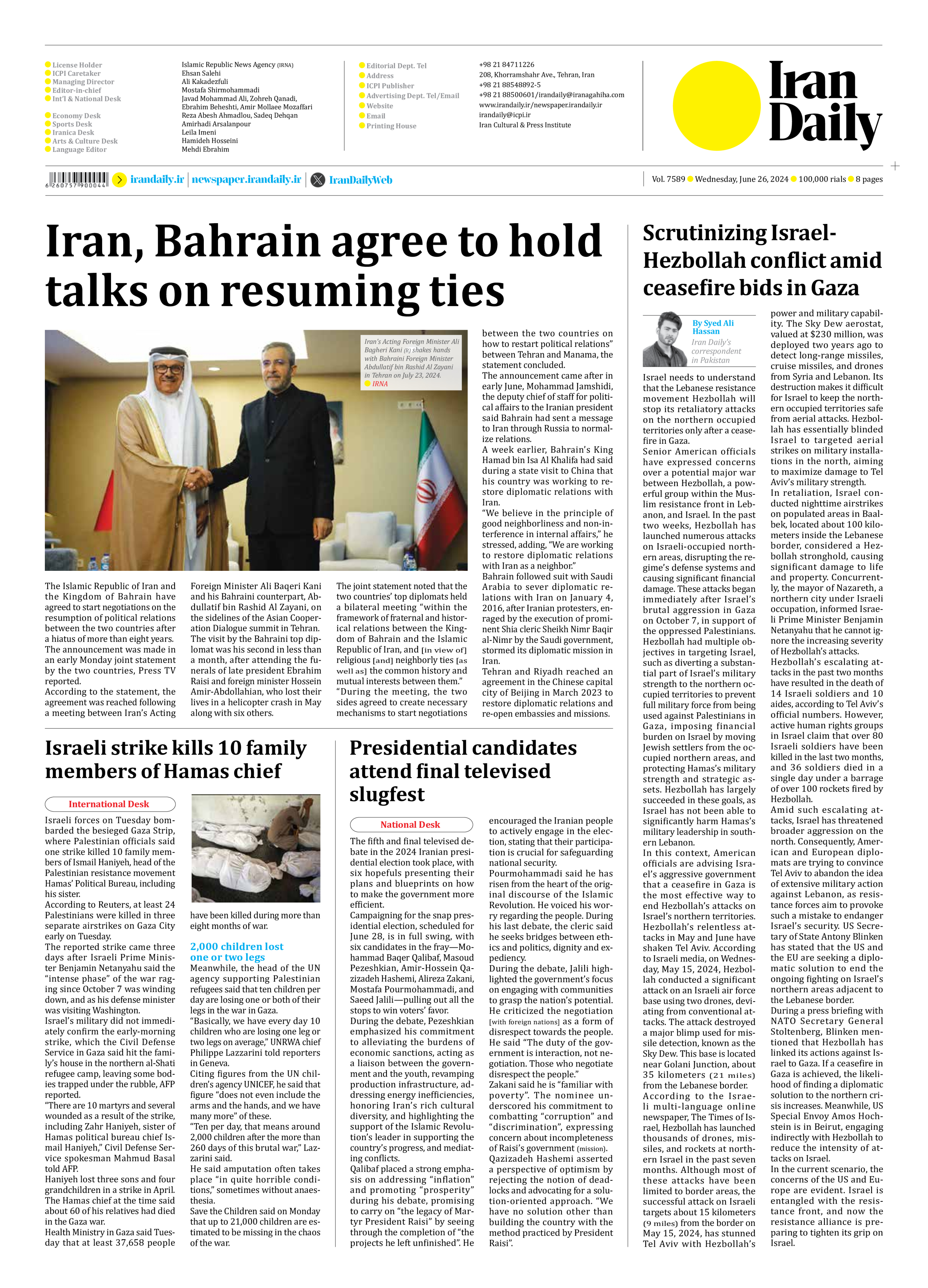
Scrutinizing Israel-Hezbollah conflict amid ceasefire bids in Gaza
By Syed Ali
Hassan
Iran Daily’s correspondent
in Pakistan
Israel needs to understand that the Lebanese resistance movement Hezbollah will stop its retaliatory attacks on the northern occupied territories only after a ceasefire in Gaza.
Senior American officials have expressed concerns over a potential major war between Hezbollah, a powerful group within the Muslim resistance front in Lebanon, and Israel. In the past two weeks, Hezbollah has launched numerous attacks on Israeli-occupied northern areas, disrupting the regime’s defense systems and causing significant financial damage. These attacks began immediately after Israel’s brutal aggression in Gaza on October 7, in support of the oppressed Palestinians. Hezbollah had multiple objectives in targeting Israel, such as diverting a substantial part of Israel’s military strength to the northern occupied territories to prevent full military force from being used against Palestinians in Gaza, imposing financial burden on Israel by moving Jewish settlers from the occupied northern areas, and protecting Hamas’s military strength and strategic assets. Hezbollah has largely succeeded in these goals, as Israel has not been able to significantly harm Hamas’s military leadership in southern Lebanon.
In this context, American officials are advising Israel’s aggressive government that a ceasefire in Gaza is the most effective way to end Hezbollah’s attacks on Israel’s northern territories. Hezbollah’s relentless attacks in May and June have shaken Tel Aviv. According to Israeli media, on Wednesday, May 15, 2024, Hezbollah conducted a significant attack on an Israeli air force base using two drones, deviating from conventional attacks. The attack destroyed a major blimp used for missile detection, known as the Sky Dew. This base is located near Golani Junction, about 35 kilometers (21 miles) from the Lebanese border.
According to the Israeli multi-language online newspaper, The Times of Israel, Hezbollah has launched thousands of drones, missiles, and rockets at northern Israel in the past seven months. Although most of these attacks have been limited to border areas, the successful attack on Israeli targets about 15 kilometers (9 miles) from the border on May 15, 2024, has stunned Tel Aviv with Hezbollah’s power and military capability. The Sky Dew aerostat, valued at $230 million, was deployed two years ago to detect long-range missiles, cruise missiles, and drones from Syria and Lebanon. Its destruction makes it difficult for Israel to keep the northern occupied territories safe from aerial attacks. Hezbollah has essentially blinded Israel to targeted aerial strikes on military installations in the north, aiming to maximize damage to Tel Aviv’s military strength.
In retaliation, Israel conducted nighttime airstrikes on populated areas in Baalbek, located about 100 kilometers inside the Lebanese border, considered a Hezbollah stronghold, causing significant damage to life and property. Concurrently, the mayor of Nazareth, a northern city under Israeli occupation, informed Israeli Prime Minister Benjamin Netanyahu that he cannot ignore the increasing severity of Hezbollah’s attacks.
Hezbollah’s escalating attacks in the past two months have resulted in the death of 14 Israeli soldiers and 10 aides, according to Tel Aviv’s official numbers. However, active human rights groups in Israel claim that over 80 Israeli soldiers have been killed in the last two months, and 36 soldiers died in a single day under a barrage of over 100 rockets fired by Hezbollah.
Amid such escalating attacks, Israel has threatened broader aggression on the north. Consequently, American and European diplomats are trying to convince Tel Aviv to abandon the idea of extensive military action against Lebanon, as resistance forces aim to provoke such a mistake to endanger Israel’s security. US Secretary of State Antony Blinken has stated that the US and the EU are seeking a diplomatic solution to end the ongoing fighting on Israel’s northern areas adjacent to the Lebanese border.
During a press briefing with NATO Secretary General Stoltenberg, Blinken mentioned that Hezbollah has linked its actions against Israel to Gaza. If a ceasefire in Gaza is achieved, the likelihood of finding a diplomatic solution to the northern crisis increases. Meanwhile, US Special Envoy Amos Hochstein is in Beirut, engaging indirectly with Hezbollah to reduce the intensity of attacks on Israel.
In the current scenario, the concerns of the US and Europe are evident. Israel is entangled with the resistance front, and now the resistance alliance is preparing to tighten its grip on Israel.







